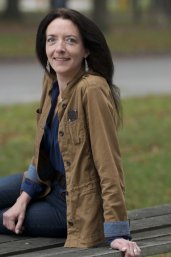In Memoriam Prof. Frauke Ohl (1966 – 2016)

The world stood still when we heard that our beloved colleague Frauke Ohl had passed away on 28 January at the far too young age of 50. Frauke had fought against cancer with all her might, but in the end she had to give up the unequal contest against the disease.
The world would be a much better place with more people like Frauke. She was - and remains - an example to us all. Her passion, vision and unceasing efforts for animal welfare, animal experiment studies, and the sustainable and peaceful cooperation between humans and animals gave direction to her life until the very last moment.
Frauke was Professor of Animal Welfare and Laboratory Animal Science and President of our Department of Animals in Science and Society. She also served as the President of the Council on Animal Affairs, member of the National Advisory Committee for Animal Experiments Policy, the Covenant for Unanesthetised Ritual Slaughter Committee and President of the Ministry of Economic Affairs’ Scientific Advisory Committee. Internationally, Frauke was active as a member of the Board of Trustees of the Universities Federation for Animal Welfare, the Federation of Veterinarians of Europe working group ‘European veterinary education in animal welfare, science, ethics and law’ and an associate member of the European College of Animal Welfare and Behavioural Medicine. However, a simple summation of her official positions does not do her justice. She was so much more.
We had the honour of working with a driven biologist who combined her specialist expertise - gained as a researcher at the German Primate Centre in Göttingen and at the Max Planck Institute for Psychiatry in Munich - with a strong personality. In partial recognition of this, she was appointed to the position of Professor of Animal Welfare and Laboratory Animal Science in 2004, and in 2006 she was named President of the Department of Animals in Science and Society at Utrecht University’s Faculty of Veterinary Medicine.
Frauke was a source of inspiration for her staff in the development and conduct of their research. In her own research, Frauke focused on the question of how emotional and cognitive processes contribute to animals’ ability to adapt to changing living conditions. With her background as an ethologist, she combined classical ethological and neurological methods. The goal of her research was to translate the animal’s perception of its emotional condition into a biological concept for animal welfare. This scientific objective was Frauke’s greatest legacy for us, and we will continue to work towards that goal with vigour and enthusiasm.
It was important to Frauke to use her knowledge of animals and their welfare for the benefit of all animals, regardless of the context in which they were kept. With her wealth of research experience with wolves and dogs, she wrote books about dogs, their behaviour and guidebooks for owners. These books, together with countless interviews for radio, television and newspapers, illustrate her deeply held need to use scientific knowledge to find practical solutions for humans and animals.
Frauke’s expertise and close connection to living beings earned her a position in the evaluation committee for the Oostvaarderssplassen nature reserve, dealing with the management of large herbivores, at the request of the Ministry of Agriculture, Nature and Food Quality. She was a member of the committee that monitored animal welfare during the culling activities to fight Q fever in the Netherlands in 2009. The fact that Frauke also became infected with Q fever had no influence on her efforts on behalf of animals.
Frauke was always conscious of the great importance of education, and always enthusiastically supported education at the faculty, national and international levels. The development of, and participation in, education on animal experiment studies, animal welfare and animal behaviour always came naturally to her.
Frauke was always able to find a balance between research, education and social activism, as witnessed by her large number of academic publications, the organisation of national and international conferences, and her excellent administrative work.
It is almost impossible to highlight every one of Frauke’s activities. But we would like to take the opportunity to list just two of the issues that were important to her over the past few years: the Centre for Sustainable Animal Stewardship and the Master’s programme in Animal Welfare Management at Utrecht University. Despite knowing about her condition at the time, she still invested considerable energy into the realisation of these institutions. Frauke has entrusted her department with the further responsibility for the two, in so doing providing direction for our future activities. We are extremely grateful for the trust she has placed in our department.
With Frauke Ohl, we have lost a person who worked tirelessly to make a better world for humans and for animals. Her leadership, inspiration and friendship will be sorely missed.
Staff of the Department of Animals in Science and Society

